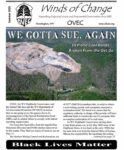For Immediate Release, May 10, 2019
|
Contact: |
Tierra Curry, Center for Biological Diversity, (928) 522-3681, tcurry@biologicaldiversity.org |
Lawsuit Launched to Force Trump Administration to Protect Endangered Species From Coal Mining in Appalachia
Documents Show High-level Interference in Enforcement
WASHINGTON— The Center for Biological Diversity and allies filed a formal notice of intent today to sue the federal Office of Surface Mining Reclamation and Enforcement, U.S. Fish and Wildlife Service and state of West Virginia for failing to protect endangered species from coal mining.
Documents obtained under the Freedom of Information Act show high-level interference by the Trump administration that is circumventing the Endangered Species Act and putting species at risk of extinction.
“The Trump administration is putting coal-industry profits ahead of people and wildlife in Appalachia whose health is threatened daily by pollution,” said Tierra Curry, a senior scientist at the Center. “Political appointees interfered to undermine endangered species safeguards, so we’re relying on the courts to protect endangered animals and the creeks where they live.”
The records show officials in West Virginia appealed to the Trump administration for shortcuts for protections for the Guyandotte River and Big Sandy crayfish, which the officials claimed were harming the coal industry.
In response Vincent DeVito, a former high-level Trump official in the U.S. Department of the Interior, did an end run around the Fish and Wildlife Service. DeVito signed a guidance document presented to him by the West Virginia Division of Mining limiting protections for the crayfish.
The state then issued mining permits in crayfish habitat. Those permits blindsided Service officials who were actively developing their own guidance to protect the crayfish. Today’s notice challenges the ongoing reliance on a slightly modified version of the state’s guidance.
The public records reveal extensive efforts by Trump administration appointees to prevent the Fish and Wildlife Service from following science and doing what is needed to protect the crayfish.
Landon Davis is a former coal advocate and Trump campaign field director now serving as a policy advisor within the Department of the Interior’s Office of Surface Mining Reclamation and Enforcement. Davis contacted Aurelia Skipwith, the Fish and Wildlife deputy assistant secretary and current nominee to lead the Service, asking her to expedite mining permits in endangered species habitat. In turn, Skipwith wrote to Greg Sheehan, then director of the Service, saying the regional office was “overstepping their bounds” by reviewing mining documents to protect the crayfish.
The Center requested the public records on mining in endangered crayfish habitat in August 2017 and then sued the agencies in March 2018 for failing to respond in a timely manner to the documents request. Groups joining today’s notice include Appalachian Mountain Advocates, OVEC – the Ohio Valley Environmental Coalition, Sierra Club West Virginia Chapter and West Virginia Highlands Conservancy.
“It’s critical to increase protections from surface mining for Appalachian endangered species,” said Ben Luckett, a senior attorney with Appalachian Mountain Advocates. “If those protections are based on sound science, as opposed to industry demands, they will have long-term benefits for people and wildlife that rely on clean air and water.”
Today’s notice also challenges the ongoing reliance on a biological opinion from 1996 that was meant to protect endangered species from coal mining nationwide, but had long failed to do so and was invalidated by the Obama administration. That invalidated biological opinion was reinstated in April 2017 by the Office of Surface Mining.
“We have a system of laws in this country for several reasons, one of which could be summarized as the fox should not be guarding the hen house, but the shortsighted Trump administration takes things even farther, and would let the fox wipe out the entire chicken coop,” said Vivian Stockman, executive director of OVEC.
Numerous scientific studies have linked coal mining in Appalachia to declines in birds, fish, salamanders, crayfish, insects and freshwater mussels. Primarily because of coal mining, there are only two surviving populations of the Guyandotte River crayfish.
“The practice of avoiding, ignoring, minimizing, altering or otherwise overriding the rules of the game — the laws and regulations meant to protect waters of West Virginia — has for years led to the ongoing demise of our most valuable headwater streams and harming the people who rely on those waters for personal use and recreation,” said Cindy Rank of the West Virginia Highlands Conservancy. “Protecting tiny critters like the Guyandotte and Big Sandy crayfish may seem insignificant or silly to some, but what we do to the least of our fellow travelers we ultimately do to ourselves.”
Mining also threatens nearby communities with air and water pollution and risk of flooding. More than 20 peer-reviewed scientific studies have now linked mining pollution in Appalachia to health problems, including increased risk of cancer, cardiovascular disease and birth defects.
“Extinction is forever, and the Endangered Species Act requires that all federal agencies work together to preserve our natural heritage. Every time the coal industry kills a stream, West Virginia becomes a little less ‘wild and wonderful,’ like the state’s motto proclaims. That has to stop, and the federal agencies that let it happen need to do their job,” said Jim Kotcon, conservation chair of the West Virginia chapter of the Sierra Club.








